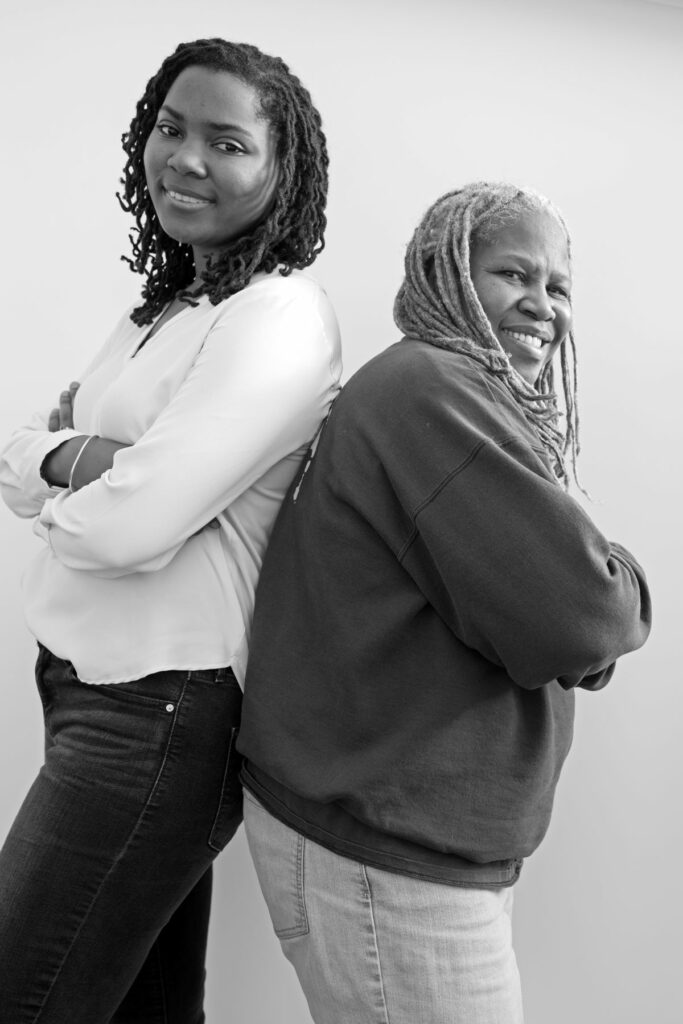FOUNDERS: KAREN WASHINGTON + OLIVIA WATKINS
Lives In: Orange County, New York, and Connecticut
Working Toward: Equal Access to Capital for Black Farmers and Food Entrepreneurs
As a little girl growing up in the Bronx, Karen Washington spent her Saturday mornings like most kids: plopped in front of the TV. But unlike most little girls, Washington would wake up an hour before the cartoons came on to catch her favorite program, “U.S. Farm Report.” While naturally drawn to farm work, Washington grew up in the projects and didn’t have access to land.
But when she became a homeowner, she immediately started a garden. When she took a bite of one of her first tomatoes, she was hooked. “I always say it was a tomato that changed my world,” she says.
Since then, Washington’s hands have been rooted in the soil. In the Bronx, she turned vacant lots into community gardens and spearheaded farmers’ markets. She co-founded Black Urban Growers, an initiative that advocates for rural and urban Black farmers, and is a co-owner of Rise & Root Farm in Orange County, NY. Advocating on a policy level, Washington is the former president of the New York City Community Garden Coalition and also served on the boards of Just Food and WhyHunger. Her work has earned her several accolades, including a 2010 National Medal awarded by Michelle Obama for her work in Bronx urban gardens.
While at a food conference in 2017, she and other progressives of color discussed a long-standing issue in the community: the color disparity in American farming. Despite a historic legacy of farming, Black Americans have been systematically excluded from power in agriculture. In 1919, Black farmers owned 14% (17.5 million acres) of American farmland. Today, Black farmers own less than 2% of American farmland, or only 3 million acres. In 1994, the USDA reported that “minorities received less than their fair share of USDA money for crop payments, disaster payments, and loans.” According to Washington, it was time for the Black community to do what we’ve always done: construct a support system for us, by us.

“We always complain, ‘They never give us any money.’ Why do we always try to work on ‘them’ to give us money?” she asks. “Let’s try and think about what we can do within our community.” When she asked who wanted to help her to build a fund, only one person raised a hand: Olivia Watkins.
When it comes to farming, Watkins considers herself a scientist. Receiving her undergrad in environmental biology, she studied high-quality, biodiverse soil and how it relates to the nutrient density of food. She also worked at Kahumana Organic Farms in Hawaii and Soul Fire Farm in Petersburgh, New York, where she grew regionally appropriate crops and learned the pathways that food travels to get from soil to plate. Like Washington, she was interested in helping Black farmers access capital.
“There’s a massive racial wealth gap across industries,” says Watkins. “[Farmers] who do not have the privilege of land being passed down, or don’t have family money, are often excluded from accessing more capital.”
In 2019, they officially launched the Black Farmer Fund (BFF), a community-led investment fund to support Black farmers and food entrepreneurs. Selected by an investment committee of their peers, BFF provides grants and loans to community-driven businesses, whether that means they use sustainable farming practices or fight for economic justice. The fund also offers technical assistance, including business development and financial support, to foster long-term success.
“Today, Black farmers own less than 2% of American farmland,
or only 3 million acres.”
“What does it look like to repair credit, save, and invest within the Black community?” said Washington. “It’s not about paying us back. It’s about ‘How can we make sure that you succeed?’”
In 2021, the organization’s pilot fund raised $1.1 million and supported eight agricultural businesses in New York State. In 2023, the James Beard Foundation awarded Washington and Watkins its Humanitarian of the Year Award.
In March 2023, BFF 2.0 launched with the goal of raising $20 million in integrated capital funds. The goal is to support 30 Black farmers and agricultural businesses across the Northeast over the next four years. The fund hopes to continue empowering the Black community and to foster a more robust, equitable farming system.
“We’re focused on continuing to deploy the $20 million raise and continuing to shift the narrative about the success of Black farmers and their importance in the food system,” says Watkins.



